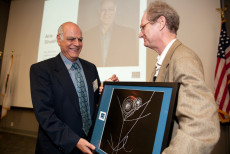Arie Shoshani Earns Berkeley Lab Lifetime Achievement Award
August 12, 2013
Jon Bashor

Arie Shoshani (left) accepts a lifetime achievement award from Berkeley Lab Director Paul Alivisatos.
More than 25 years ago, Arie Shoshani realized that researchers were facing significant challenges in organizing, managing and analyzing their scientific data so he set out to develop computer applications to help them better meet the challenges. The leader of Berkeley Lab’s Scientific Data Management Research Group, Shoshani was honored at an Aug. 8 ceremony with the Berkeley Lab Prize for Lifetime Scientific Achievement.
Berkeley Lab Director Paul Alivisatos presented the award in front of an enthusiastic crowd filling the Building 50 auditorium. Alivisatos noted that the recently published book, The Fourth Paradigm: Data-Intensive Scientific Discovery, “caught up with where Arie was 25 years ago – well before the idea had concurrency and decades before others.” Shoshani laid the early foundations for understanding the massive datasets that are increasingly a hallmark of research, Alivisatos said.
“Arie was really out there early on, became a leader and has left his indelible mark on the field,” Alivisatos said.
Shoshani, who has led his group since 1978, currently directs the Department of Energy’s Scalable Data Management, Analysis, and Visualization (SDAV) institute, which includes members from six DOE laboratories and seven universities). He previously led DOE’s Scientific Data Management Center for Enabling Technology, a 10-year collaboration involving research from five DOE laboratories and five universities. He also conducts his own research in the characterization of the unique requirements of scientific databases, query languages, modeling of statistical and scientific data, temporal data, multi-dimensional data and data indexing.
Shoshani was co-winner of a 2008 R&D 100 award for the FastBit indexing method with Kesheng “John” Wu, Ekow Otoo and Kurt Stockinger; and in 2009, he was co-editor with Doron Rotem of the book, “Scientific Data Management: Challenges, Technology, and Deployment.”
He also continues to act as the steering committee chair of the Scientific and Statistical Data Base Management (SSDBM) conference series as he has since its inception in 1981, a conference that alternates between the USA and Europe, promoting exposure and international cooperation in the scientific data management area.
He has been an invited speaker at scientific conferences, earned Best Paper awards for his research papers and held leadership positions in professional organizations. Shoshani has published over 150 papers in refereed journals and conferences.
In accepting his award, Shoshani said his career at Berkeley Lab has been very rewarding, especially in that he has been able “to rub shoulders with scientists across all domains and learn about research in those domains.” At the same time, he was able to work with many of those scientists to help address the challenges posed by growing amounts of data. He said he was also gratified to see that over the course of his work at the lab, computer science has been validated as being a valuable tool for scientific discovery, as well as a science in its own right.
About Berkeley Lab
Founded in 1931 on the belief that the biggest scientific challenges are best addressed by teams, Lawrence Berkeley National Laboratory and its scientists have been recognized with 16 Nobel Prizes. Today, Berkeley Lab researchers develop sustainable energy and environmental solutions, create useful new materials, advance the frontiers of computing, and probe the mysteries of life, matter, and the universe. Scientists from around the world rely on the Lab’s facilities for their own discovery science. Berkeley Lab is a multiprogram national laboratory, managed by the University of California for the U.S. Department of Energy’s Office of Science.
DOE’s Office of Science is the single largest supporter of basic research in the physical sciences in the United States, and is working to address some of the most pressing challenges of our time. For more information, please visit energy.gov/science.









